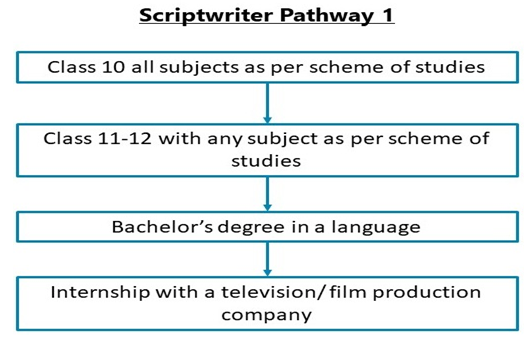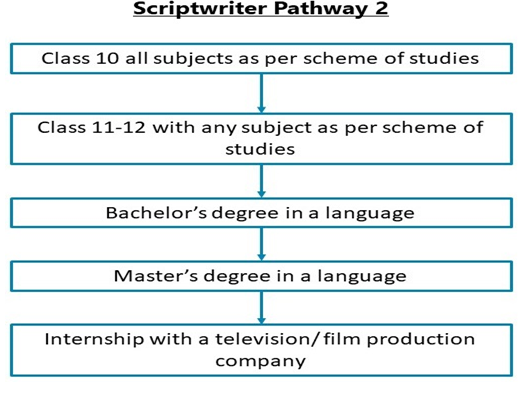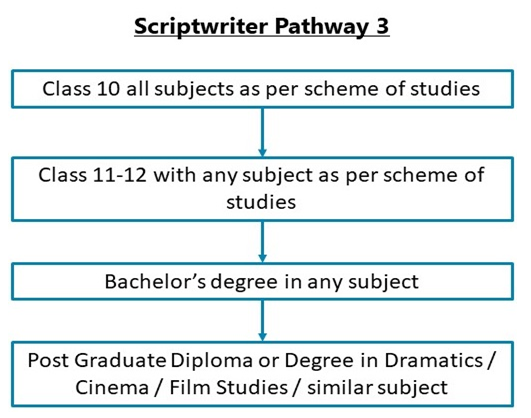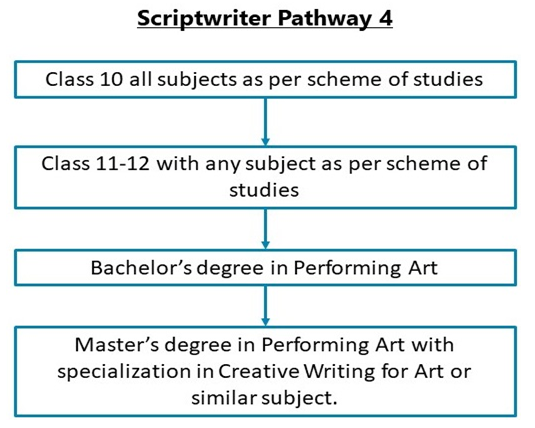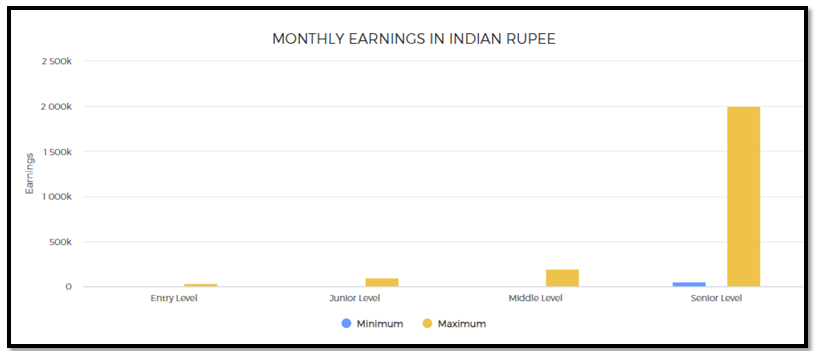Scriptwriter
Entry Level Qualification
12
Career Fields
Performing Arts
For Specially Abled







Career Entrance Exam
About Career
1. A script is a written text or a document which constitutes the essentials for telling a story. A good script is a blend of well-written scenes, characters, plots. dialogues, and actions which are narrated creatively. Therefore as a scriptwriter, you’d get to use your creative imagination and writing skills to create a whole new fictional world and share your stories and ideas to prospective producers and directors. A career as a scriptwriter is not only challenging but is a great pathway for those who have a knack for creative writing and can write lengthy and interesting stories and write-ups.
2. Scripts are usually written for cinema / films, theatre / pays, and commercial advertisement films. As a scriptwriter, you might choose for which set of genre you’d want to write scripts for. For example, there are two types in which scripts are majorly written - Screenplay writing and Playwriting. For those who have interests in films and television series, can consider writing scripts for movies and web series, whereas those who are well versed with drama and theatre can consider writing scripts for plays.
3. As a screenplay writer, you will be writing scripts for films and television programs and series. You can start writing your own scripts individually which will also help you in building a portfolio or you can take up ideas from existing write-ups from different and experienced writers. While writing for films and television series, it is mostly the movements, actions, expressions and the dialogues that are narrated properly, so as a writer you will be brainstorming in adding perfection to each and every shot, action and dialogue.
4. In the case of writing for a play, you will be writing for a stage setting which has limited spatial and temporal liberty. Your main function as a writer would be to create scenes and situations which are acted on the stage. So your main focus would be in creating dialogues, stage directions and scenes that are gripping for the audience as well as leaves a message as the play ends. As a writer, you can decide for which particular genre- you wish to write in. For example as a screenplay writer you may consider writing for- Feature Films, Television serials, or Documentaries. Each field requires a thorough understanding of the fundamentals of screenplay writing.
5. So, as a scriptwriter, you will be responsible for writing dialogues, developing the intriguing plot, writing dialogues for a given situation or creating situations for films as well as play. You will also be involved in working under deadlines, writing and creating original stories and creating interesting and complex plots, within a required structure and in a specified composition.
Key Role and Responsibilities:
As a scriptwriter, you will be engaged to the following key roles and responsibilities:
1. Writing themes, plots, characterizations, psychological analysis, historical information and facts, action, and dialogue to create a story or plot structure for films or play.
2. Writing scripts and pieces for popular cinema, television serials, and advertisements.
3. Revising written work to meet personal standards and to satisfy the needs of clients, publishers, directors, or producers.
4. Coordinating withProducers, Directors, Cinematographers, DOP, Editors, and SFX/VFS Artiststo review and modify dialogues, scenes, and actions.
5. Following appropriate procedures to get copyrights for completed work.
PARTICULARS | DESCRIPTION |
Name | Scriptwriter |
Purpose | Writing Scripts And Pieces |
Career Field | Performing Arts |
Required Entrance Exam | No Entrance Exam |
Average Salary | 60000 - 500000 Rs. Per Year |
Companies For You | Cinema, Short Films, Television Serials, Web Series & Many More |
Who is Eligible | Class 12th Pass |
Career Entry Pathway
Class 10 all subjects as per scheme of studies – Class 11-12 with any subject as per scheme of studies – Bachelor’s degree in a language – Internship with a television/ film production company
After completing Class 10 all subjects as per scheme of studies, then Class 11-12 with any subject as per scheme of studies, and a graduation degree in any language you can go for a course in creative writing. A course in creative writing would help you in getting more opportunities in this industry.
Class 10 all subjects as per scheme of studies – Class 11-12 with any subject as per scheme of studies – Bachelor’s degree in a language – Master’s degree in a language – Internship with a television / film production company
After completing Class 10 all subjects as per scheme of studies, then Class 11-12 with any subject as per scheme of studies, and a bachelor’s degree followed by a master’s degree in a language, you can go for a course in creative writing. A master’s degree with a creative writing course would help you in getting internship opportunities in the television/film industry.
Class 10 all subjects as per scheme of studies – Class 11-12 with any subject as per scheme of studies – Bachelor’s degree in any subject – Post Graduate Diploma or Degree in Dramatics / Cinema / Film Studies / similar subject
After completing Class 10 all subjects as per scheme of studies, then Class 11-12 with any subject as per scheme of studies, a bachelor’s degree in any subject. You can pursue diploma courses, foundation courses and postgraduate courses in Dramatics, Cinema, and Film studies from the following institutes: three-year full-time diploma courses in Dramatic Arts from National School of Drama, foundation course in Screenplay Writing (Jaipur), foundation course in Fiction Writing for Television (New Delhi) from Film and Television Institute of India, a diploma in Direction & Screenplay Writing from Satyajit Ray Film & Television Institute.
Class 10 all subjects as per scheme of studies – Class 11-12 with any subject as per scheme of studies – Bachelor’s degree in Performing Art – Master’s degree in Performing Art with specialisation in Creative Writing for Art or similar subject.
After completing Class 10 all subjects as per scheme of studies, then Class 11-12 with any subject as per scheme of studies, a bachelor’s degree in Performing Arts followed by a master’s degree in Performing arts you can go for a bachelor’s program in performing arts or a master’s in performing arts along with a specialisation course in creative writing for Art or Films from the following universities in India are- Apeejay College of Fine Arts, Banaras Hindu University, Andhra University. A bachelor’s degree in Performing Arts followed by a master’s degree in Performing arts with a specialisation in Creative writing, you can go for a bachelor’s program in performing arts or a master’s in performing arts from the following International universities- Undergraduate in writing for screen and television from The University of Southern California's (USC) School of Cinematic Arts, Bachelors of Arts degree with specialisation in Screen writing University of California, Los Angeles (UCLA).
Required Qualification & Competencies
After completing a bachelor’s degree in any discipline (preferably in a language or in Performing Arts studies or in Film Studies), you can go for a master’s level or postgraduate diploma course in Creative writing / Film Studies / Cinema / Creative Writing for Performing Arts/ Creative Writing for Art, etc. For admission in a master’s or a postgraduate diploma course, you need a three years bachelor’s degree in a language / performing arts / other discipline. Along with bachelors, a foundation course in Creative Writing or Film studies can be considered.
MINIMUM EDUCATION REQUIRED | MAXIMUM EDUCATION REQUIRED |
Under Graduate | Post Graduate |
Compentencies Required
Interests
1. Artistic: You should have interests for Artistic Occupations. Artistic occupations mostly involve working with creative ideas, art and designs. These occupations involve abstract or conceptual thinking, creative self-expression and often do not follow any set processes or rules for getting things done.
2. Enterprising: You should have interests for Enterprising Occupations. Enterprising occupations involve taking initiatives, initiating actions, and planning to achieve goals, often business goals. These involve gathering resources and leading people to get things done. These require decision making, risk taking and action orientation.
Abilities
1. Abstract Reasoning: The ability to understand ideas which are not expressed in words or numbers; the ability to understand concepts which are not clearly expressed verbally or otherwise.
2. Emotional Intelligence: The ability to understand your own and others' emotions and feelings; empathy for others; adjusting your behaviour or self-control and self-regulation according to others' emptions and situations.
3. Fluency of Ideas: The ability to come up with a number of ideas about a topic (the number of ideas is important, not their quality, correctness, or creativity).
4. Originality: The ability to come up with unusual or innovative ideas about a given topic or situation, or to develop creative ways to solve a problem.
5. Selective Attention: The ability to concentrate on a task over a long period of time without being distracted.
6. Verbal Reasoning: The ability to think and reason with words; the ability to reason out ideas expressed in words.
7. Written Comprehension: The ability to read and understand information and ideas presented in writing.
8. Written Expression: The ability to communicate information and ideas in writing so others will understand.
Knowledge
1. Performing Arts: Knowledge about the theories and techniques required for producing various works of performing arts such as music, dance, drama, theatre, film, television series, etc.
2. English Language: Knowledge about English grammar, words, spelling, sentence construction, using English to communicate with others, reading in English, etc. (if you want to write scripts in English)
3. Vernacular Language: Knowledge about the grammar, words, spelling, sentence construction, etc. of a local language and using the language to communicate with others, reading, etc. (if you want to write scrips in an Indian regional language such as Hindi, Tamil, Telugu, Malayalam, Bengali, Marathi, etc.)
4. Foreign Language: Knowledge about the grammar, words, spelling, sentence construction, etc. of a foreign language and using the language to communicate with others, reading, etc. (if you want to write scripts in a foreign language other than English such as French, Spanish, Chinese, Japanese, etc.)
Personality
1. You are always or mostly a soft-hearted person.
2. You are always imaginative or in most situations.
3. You always prefer to experience new things and have new experiences or you mostly do.
4. You can always act independently or could do so in most situations.
5. You trust others sometimes but not always.
6. You are helpful to others sometimes.
7. You are mostly impulsive in your action and behaviour.
Career - Job Opportunities & Profiles
In most likely situation, you will have to work as an intern or assistant to an established Scriptwriter whereby your role will be mostly to research materials for the script. The Scripwriter may give part of the script to be written and depending upon your work quality, larger parts of scripts may come your way. You may also attempt to intern with a film/television production company, specially television series or serial production companies. Assistant Scriptwriters are often required by these companies as a lot of scripts are required, specially for the mega or daily series or serials. Then there are companies which produce web series or web films. So, overall, getting the first work as an Intern or an Assistant Scriptwriter is not extremely difficult if your writing skills and storywriting skills are excellent.
Over a period of time, you may start getting offers to work as a Scriptwriter (Screenplay writer or Play Writer) with television production companies, film production companies, television commercial ad film making companies, and web film/series production companies. There are companies which do all these as well.
Specialisation Tracks In This Career
Screenplay writer
As a Screenplay writer, you will have to write for a variety of visual mediums like cinema, short films, television serials, web series etc.
Play writer
As a play writer, you will be writing plays voluntarily or professionally for a drama company or organization. The work as a play writer can be a strenuous task as it involves a deep level of thinking for creating complex characters, intriguing plot, well-structured dialogue writing, and demonstration of stage directions. You may start off as a freelance writer and then can further your experience as a professional playwright for theatre and performing arts societies and communities.
Career Growth
As stated under job opportunities, you will most likely begin as an Intern or Assistant Scriptwriter. Then you progress as an independent Scriptwriter. Some of you may attempt to progress into becoming a filmmaker or a producer or a director. The first step in filmmaking or direction is a role as an Assistant Director. Similar the first step in producing is a roles as an Assistant Producer. A good script is one of the key cornerstone for a film/television series/commercial film/theatre performance. If you become adept and well-known in Scriptwriting, a lot of opportunities will come your way.
Salary Offered
1. As said under the job opportuties, most likely, you will begin as an Intern or Assistant Scriptwriter with a senior professional Scriptwriter or with a film/ television/ web/ commercial ad film production company/ theatre group. You may have to work without any money as an Intern but as an Assistant Scriptwriter, depending upon the size of the company and what kind of work they are doing, you may get about Rs. 500-1000 per episode of a television series or about Rs. 5,000-40,000 for a feature film. With theatre groups, you may make about Rs. 500 - 10,000 for a play.
2. However, if you keep on producing good work, you may start earning much more - say about Rs. 1000 - 8,000 per episode of a television series / about Rs. 10,000 - 1,00,000 for a feature film.
3. When you start getting work as an independent Scriptwriter, you can make about Rs. 5,000 - 20,000 per episode of a television series / about Rs. 1,00,000 - 2,00,000 for a feature film script. The range depends on whether you are working for a regional production or a production in Hindi/Tamil/Telegu, etc. Regional production fetch you lower earning.
Monthly Earnings In Indian Rupee
1. Entry level: 0 - 2 years of work experience
2. Junior Level: From 1 to 12 years of work experience
3. Mid Level: From 5 to 20+ years of work experience
4. Senior Level: From 10 to 25+ years of work experience (there could be exceptions in some high-end technical, financial, engineering, creative, management, sports, and other careers; also in the near future, people will reach these levels much faster in many careers and in some careers, these levels will have no meaning as those careers will be completely tech skill driven such as even now, there is almost no level in a Cyber Security Expert’s job)
Work Activities
1. Creative thinking: Developing new ideas, concepts, innovative solutions to problems, newer ways of getting things done, designing products and services, creating work of art and craft, etc.
2. Getting Information and learning: Observing, hearing, reading, using computers, or otherwise obtaining information and learning from it.
3. Managing and supervising: Managing and supervising work of others; setting goals; giving instructions; monitoring work performance, etc.
4. Organising, planning and prioritising tasks: Planning and organising tasks in order to achieve work goals; prioritising tasks to achieve goals and making the best use of the time available.
5. Using computers for work: Using computers for day-to-day office work; using computer software for scriptwriting, using scriptwriting software’s for writing in well-structured formats.
Future Prospects
The road ahead for this career pathway looks bright as the Indian Media and Entertainment industry sector is growing rapidly. This industry is seeing higher growth prospects due to a growing number in consumer demands for television series, web series, cinemas, etc. as it is majorly driven by increasing digitization and higher internet usage.
Since this industry is witnessing a huge demand in consumer needs, Media and Television industry is preparing for a broader network. The industry is expected to grow of CAGR (Compound Annual Growth Rate) of 10.90% to 13.10% in this year. Industries in India are working towards establishing itself as a forerunner in industrialization and technological developments because of which the M&E industry is introducing interactive screenplays. The screenplays have thus become more futuristic and have created a world of possibilities for overtly imaginative scriptwriters.
With ongoing technological advancements, it has become possible to imagine that screenwriting software will be also able to create living and breathing screenplays that can utilize conceptual art, photos, and other visual assistance. With the growth in the internet and streaming channels and particularly in the film industry, there is a demand for more content. Thus it is expected that there will be a number of job opportunities for prospective scriptwriters in the coming future.
Future Prospects At a Glance


